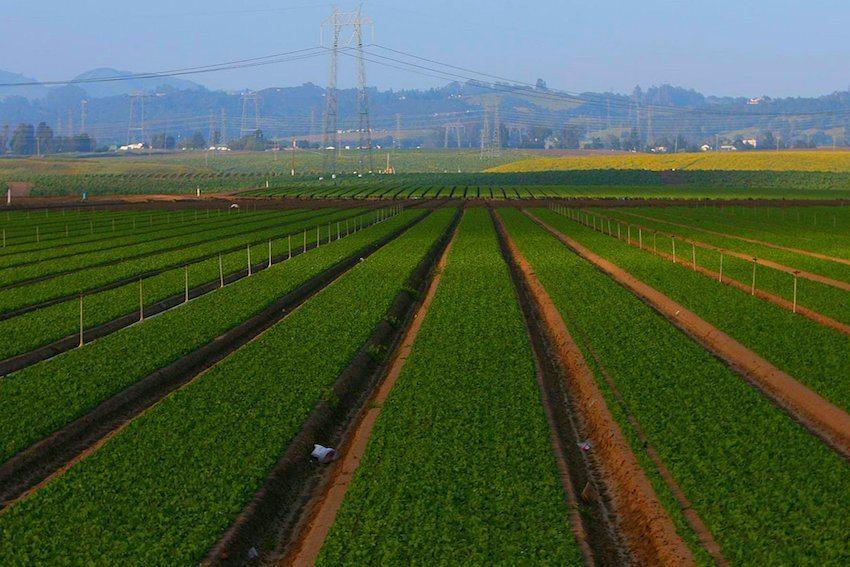New economic barriers threaten state agricultural exports
Part of President Donald Trump’s recent executive orders included imposing additional tariffs on steel and aluminum from China. As a result, China retaliated by imposing similar tariffs on a variety of agricultural products imported from California.
Almonds, pistachios, grapes and oranges are among the crops affected by the tariff. According to the Fresno County Farm Bureau, Fresno County raises over 350 crops, with these being a part the top 10 exported to China.
Fresno County boasts 1.88 million acres of farmland, supplying more than $5.6 billion to the California economy. Farming creates over 20% of all jobs in the Fresno area, making the county crucial to the nation’s economy. Many of the crops grown in the area do not grow anywhere else.

David Triplitt works for Wells Fargo in the agribusiness group and has financed farmers for over 25 years. He recognizes the negative effects this order might potentially have on the agriculture industry in California, but believes there is not enough information to know for sure.
“We don’t know much yet as nothing is finalized,” Triplitt said. “Basically, the price of exported ag commodities will go up in China, which may decrease demand. As a result we will sell less to China or have to lower our prices to sell product to China to make up for the new tariffs. If the tariffs stick this will affect ag in the Fresno area, mainly almonds, pistachios, beef and citrus.”
Citrus is grown along Highway 180 and northeast along 168 north of Clovis. Naval oranges, Valencia oranges, Tangerine and Mandarin oranges contributed over 500,000 tons in output in recent years.
Citrus farmer Bobby Hines works with Kings River Packing, an independent citrus growing, packing and shipping organization. Hines considers the detrimental influence the tariff will hold on citrus commerce.
I believe the effect that farmers here in California will experience will be minimal. Back in February, we experienced one of the worst freezes in almond history, and the immediate result was an increase in the sale price of bulk almonds. The 2018 crop should come in much lower than expected and the price should be much higher than 2017, so even if we see a dip in price over the China situation, it might be virtually unnoticeable. — Jonothan Degroot, dairy farmer
“This definitely will affect our industry,” Hines said. “Our company currently only exports fruit to South Korea, Canada and Japan, but China is the third largest export market for the California Citrus industry behind Canada and Korea. We currently enjoy a competitive advantage over Spain due to our shipping costs being lower than theirs.
“The tariffs will push our pricing higher, allowing Spanish fruit to become more affordable to the Chinese,” Hines continued. “If we lose market share in China, that will put more pressure on our other markets, causing a downward pressure on price. Our assumption is that it will negatively affect our entire industry. Our hope is that there is some middle ground found in the near future where we can get the tariffs removed.”
Raisins and grapes are also high value commodities. There are over 20 wineries and packing facilities in and around the Fresno area, all supporting grape production.
President Trump’s trade war will hit California farmers hard. $2 billion worth of CA exports—including all exported almonds, walnuts, raisins, plums, grapes, kiwis, dates and figs—will now be subject to a 15 % tariff when exported to China. How does that protect American jobs? pic.twitter.com/BntyP2KXcl
— Sen Dianne Feinstein (@SenFeinstein) April 4, 2018
Local grape and almond farmer Ed Fikse is one of many farmers associated with Allied Grape Growers and O’Neill vintners. Although he has some concerns, he believes this will not harm overall exports.
“The tariffs could cause short term problems because of the unsteadiness fear factor,” Fikse said. “I don’t think this will cause too much disruption because there are loopholes in which our almonds will probably get traded to Hong Kong, then from there to China. I think something like this had to happen. Our trade with China is way off balance, with China being the benefactor. We import more than we export. The good news out of this right now is that they need us more than we need them.”
In recent years, nuts have become another keystone crop important to the Central Valley. Almonds acres specifically can be found in Belmont just east of Fowler Avenue, Whitesbridge west of Hayes and on the westside near highway 198 and I-5.
As well as being a dairyman, Jonathon Degroot grows hay, wheat, corn, almonds and very recently began growing grapes. He works with California Dairies Incorporated, as well as Harris Woolf Almonds. Overall, Degroot feels the almond industry will be unaffected by the recent tariffs.

“As an almond farmer, the new tariffs certainly cause me to stop and take a look at what’s going on,” Degroot said. “I think the tariffs might cause a slight drop in the price farmers are paid for their crop for the 2018 year, but I believe that ultimately, the tariffs will be dropped. China depends heavily on the California almond market to supply protein to the country and almonds are the most available product to meet that need. Also, there are very few places in the world that almonds can be grown. California is by far the largest producer of almonds in the world. The problems will most likely be short lived.
“I believe the effect that farmers here in California will experience will be minimal,” Degroot continued. “Back in February, we experienced one of the worst freezes in almond history, and the immediate result was an increase in the sale price of bulk almonds. The 2018 crop should come in much lower than expected and the price should be much higher than 2017, so even if we see a dip in price over the China situation, it might be virtually unnoticeable.”
Although the tariff prompts uncertainty in many farmers, it’s undetermined as of yet if this will cause any significant impact on the many agricultural industries in the Central Valley.
For more articles, read Fresno residents reflect on homeless crisis, pt. 2 and Childhood events shape personality and affect adulthood.










![[Video] 100th CSPA Spring Journalism Conference](https://thefeather.com/wp-content/uploads/2024/04/20240308-cspa-crown-002.jpg)
![[Video] New York Day 4](https://thefeather.com/wp-content/uploads/2024/04/NY-trip-day-4-JC-.jpg)






Jewel • Apr 13, 2018 at 2:35 pm
Great article!